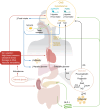Novel medications for problematic alcohol use
- PMID: 38828724
- PMCID: PMC11142745
- DOI: 10.1172/JCI172889
Novel medications for problematic alcohol use
Abstract
Alcohol-related harm, a major cause of disease burden globally, affects people along a spectrum of use. When a harmful pattern of drinking is present in the absence of significant behavioral pathology, low-intensity brief interventions that provide information about health consequences of continued use provide large health benefits. At the other end of the spectrum, profound behavioral pathology, including continued use despite knowledge of potentially fatal consequences, warrants a medical diagnosis, and treatment is strongly indicated. Available behavioral and pharmacological treatments are supported by scientific evidence but are vastly underutilized. Discovery of additional medications, with a favorable balance of efficacy versus safety and tolerability can improve clinical uptake of treatment, allow personalized treatment, and improve outcomes. Here, we delineate the clinical conditions when pharmacotherapy should be considered in relation to the main diagnostic systems in use and discuss clinical endpoints that represent meaningful clinical benefits. We then review specific developments in three categories of targets that show promise for expanding the treatment toolkit. GPCRs remain the largest category of successful drug targets across contemporary medicine, and several GPCR targets are currently pursued for alcohol-related indications. Endocrine systems are another established category, and several promising targets have emerged for alcohol indications. Finally, immune modulators have revolutionized treatment of multiple medical conditions, and they may also hold potential to produce benefits in patients with alcohol problems.
Conflict of interest statement
Figures


Similar articles
-
New Australian guidelines for the treatment of alcohol problems: an overview of recommendations.Med J Aust. 2021 Oct 4;215 Suppl 7:S3-S32. doi: 10.5694/mja2.51254. Med J Aust. 2021. PMID: 34601742
-
Psychosocial and pharmacologic interventions to reduce harmful alcohol use in low- and middle-income countries.Cochrane Database Syst Rev. 2023 May 9;5(5):CD013350. doi: 10.1002/14651858.CD013350.pub2. Cochrane Database Syst Rev. 2023. PMID: 37158538 Free PMC article. Review.
-
The future of Cochrane Neonatal.Early Hum Dev. 2020 Nov;150:105191. doi: 10.1016/j.earlhumdev.2020.105191. Epub 2020 Sep 12. Early Hum Dev. 2020. PMID: 33036834
-
Right care, first time: a highly personalised and measurement-based care model to manage youth mental health.Med J Aust. 2019 Nov;211 Suppl 9:S3-S46. doi: 10.5694/mja2.50383. Med J Aust. 2019. PMID: 31679171
-
Baclofen for alcohol use disorder.Cochrane Database Syst Rev. 2018 Nov 26;11(11):CD012557. doi: 10.1002/14651858.CD012557.pub2. Cochrane Database Syst Rev. 2018. Update in: Cochrane Database Syst Rev. 2023 Jan 13;1:CD012557. doi: 10.1002/14651858.CD012557.pub3. PMID: 30484285 Free PMC article. Updated.
Cited by
-
Integrating Drug Target Information in Deep Learning Models to Predict the Risk of Adverse Events in Patients with Comorbid Post-Traumatic Stress Disorder and Alcohol Use Disorder.Biomedicines. 2024 Dec 5;12(12):2772. doi: 10.3390/biomedicines12122772. Biomedicines. 2024. PMID: 39767679 Free PMC article.
-
Recent advances in alcohol metabolism: from the gut to the brain.Physiol Rev. 2025 Oct 1;105(4):2501-2535. doi: 10.1152/physrev.00053.2024. Epub 2025 Jul 10. Physiol Rev. 2025. PMID: 40637545 Free PMC article. Review.
-
Gut Microbiome-Liver-Brain axis in Alcohol Use Disorder. The role of gut dysbiosis and stress in alcohol-related cognitive impairment progression: possible therapeutic approaches.Neurobiol Stress. 2025 Feb 8;35:100713. doi: 10.1016/j.ynstr.2025.100713. eCollection 2025 Mar. Neurobiol Stress. 2025. PMID: 40092632 Free PMC article.
-
Glucagon-like peptide-1 receptor agonists, but not dipeptidyl peptidase-4 inhibitors, reduce alcohol intake.J Clin Invest. 2025 Mar 6;135(9):e188314. doi: 10.1172/JCI188314. eCollection 2025 May 1. J Clin Invest. 2025. PMID: 40048376 Free PMC article.
-
Efficacy and safety of varenicline and bupropion, in combination and alone, for alcohol use disorder: a randomized, double-blind, placebo-controlled multicentre trial.Lancet Reg Health Eur. 2025 May 13;54:101310. doi: 10.1016/j.lanepe.2025.101310. eCollection 2025 Jul. Lancet Reg Health Eur. 2025. PMID: 40487775 Free PMC article.
References
-
- World Health Organization. Global status report on alcohol and health 2018. WHO website. https://iris.who.int/bitstream/handle/10665/274603/9789241565639-eng.pdf... Accessed April 17, 2024.
-
- American Psychiatric Association. Diagnostic and Statistical Manual of Mental Disorders, Fourth Edition, Text Revision. Washington, DC: American Psychiatric Association; 2000.

